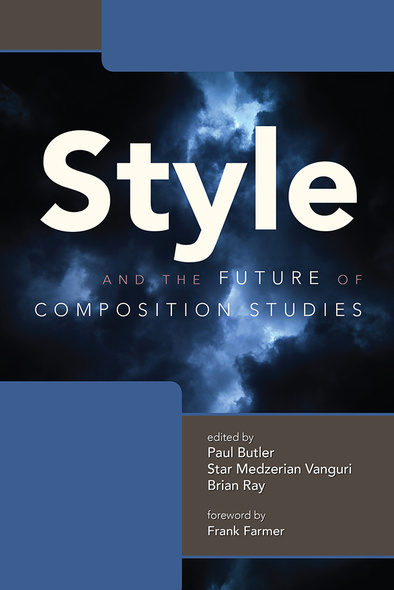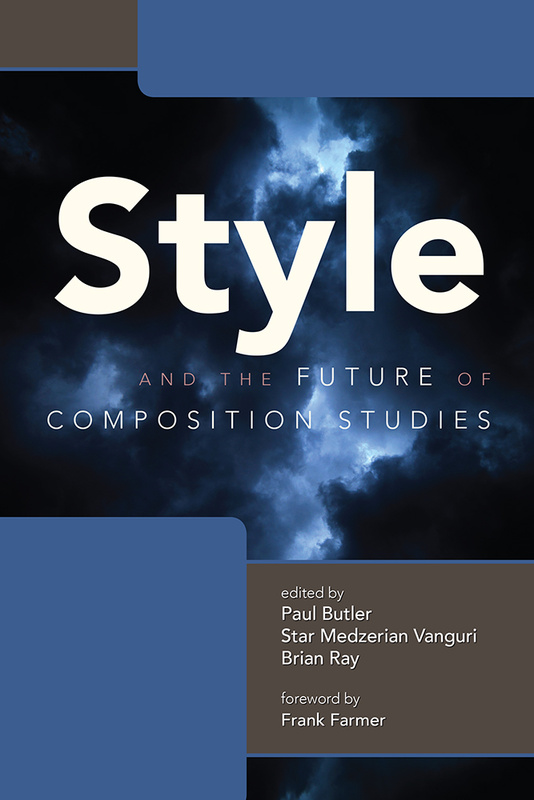Our shopping cart is currently down. To place an order, please contact our distributor, UTP Distribution, directly at utpbooks@utpress.utoronto.ca.
Style and the Future of Composition Studies
Utah State University Press
Style and the Future of CompositionStudies explores style’s potential for informing how students are taught to write well and its power as a tool for analyzing the language and discourse practices of writers and speakers in a range of contexts.
Many college writing teachers operate under the belief that style still refers primarily to the kinds of issues discussed in Strunk and White’s popular but outdated book The Elements of Style. This work not only challenges this view but also offers theories and pedagogies from diverse perspectives that help teachers and students develop strategic habits and mindsets to negotiate languages, genres, and discourse conventions. The chapters explore the ways in which style directly affects—and is affected by—multiple sources of shifting disciplinary inquiry, contributing new insights by drawing on research in cultural studies, sociolinguistics, discourse studies, translingualism, and writing across the curriculum, as well as new approaches to classical rhetorical theory.
The reemergence of stylistic inquiry can be used dynamically to produce new insights not only about emerging disciplinary interests but also about the study of style as a kind of language in and of itself. Style and the Future of Composition Studies demonstrates that style deserves to be a central focus of writing teaching. More than just the next style collection, the book advocates for style’s larger prominence in composition discussions generally. It will be of interest to a broad range of students and scholars of writing studies, as well as a wider set of readers in academe.
Contributors:
Cydney Alexis, Laura Aull, Anthony Box, Jimmy Butts, Mike Duncan, William FitzGerald, Melissa Goldthwaite, Eric House, TR Johnson, Almas Khan, Zak Lancaster, Eric Leake, Andrea Olinger, Thomas Pace, Jarron Slater, Jonathan Udelson
Many college writing teachers operate under the belief that style still refers primarily to the kinds of issues discussed in Strunk and White’s popular but outdated book The Elements of Style. This work not only challenges this view but also offers theories and pedagogies from diverse perspectives that help teachers and students develop strategic habits and mindsets to negotiate languages, genres, and discourse conventions. The chapters explore the ways in which style directly affects—and is affected by—multiple sources of shifting disciplinary inquiry, contributing new insights by drawing on research in cultural studies, sociolinguistics, discourse studies, translingualism, and writing across the curriculum, as well as new approaches to classical rhetorical theory.
The reemergence of stylistic inquiry can be used dynamically to produce new insights not only about emerging disciplinary interests but also about the study of style as a kind of language in and of itself. Style and the Future of Composition Studies demonstrates that style deserves to be a central focus of writing teaching. More than just the next style collection, the book advocates for style’s larger prominence in composition discussions generally. It will be of interest to a broad range of students and scholars of writing studies, as well as a wider set of readers in academe.
Contributors:
Cydney Alexis, Laura Aull, Anthony Box, Jimmy Butts, Mike Duncan, William FitzGerald, Melissa Goldthwaite, Eric House, TR Johnson, Almas Khan, Zak Lancaster, Eric Leake, Andrea Olinger, Thomas Pace, Jarron Slater, Jonathan Udelson
‘A timely next step in the evolution of style scholarship in the field of composition studies, and it’s perhaps the most important step yet taken. It will become impossible to discuss the current state of style scholarship credibly without attending closely to this volume.’
—Keith Rhodes, University of Denver‘These writers show that attention to style can enrich our thinking about teaching academic writing, bridging the divide between composition and creative writing, tapping the persuasive power of narrative and embodied rhetoric, valuing multiple varieties of English, and extending rhetorical knowledge to new contexts and new media. These are topics of pressing interest to writing scholars and teachers.’
—Nora Bacon, University of Nebraska–Omaha‘Think of [Style and the Future of Composition Studies] as a lively academic conference on style and composition—with insights from classical and modern rhetorical theory, corpus and functional linguistics, pedagogy, and ethics. . . This celebration of style will interest scholars of linguistics, communication, rhetoric, and literacy and anyone who teaches college writing.’
—CHOICE
‘Ultimately, Style and the Future of Composition Studies fulfills its promise
to introduce ways in which style and the study thereof can effect change. This
book will be an important resource for researchers and instructors looking to
update themselves on style scholarship and consider how style can speak to
change in the many subfields of composition and across disciplinary divides.’
—Roberto Leon, Composition Studies
Paul Butler is associate professor of English at the University of Houston and author of The Writer’s Style, Out of Style, and Style in Composition and Rhetoric.
Star Medzerian Vanguri is associate professor of writing in the School of Communication, Media, and the Arts at Nova Southeastern University. She is editor of Rhetorics of Names and Naming and coeditor of The Centrality of Style.
Brian Ray is associate professor and director of composition at the University of Arkansas, Little Rock. He is author of Style: An Introduction to History, Theory, Research, and Pedagogy in the Reference Guides to Rhetoric and Composition series.
Star Medzerian Vanguri is associate professor of writing in the School of Communication, Media, and the Arts at Nova Southeastern University. She is editor of Rhetorics of Names and Naming and coeditor of The Centrality of Style.
Brian Ray is associate professor and director of composition at the University of Arkansas, Little Rock. He is author of Style: An Introduction to History, Theory, Research, and Pedagogy in the Reference Guides to Rhetoric and Composition series.





